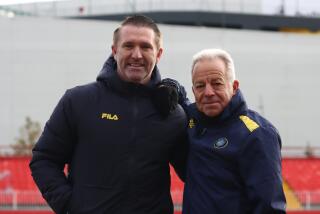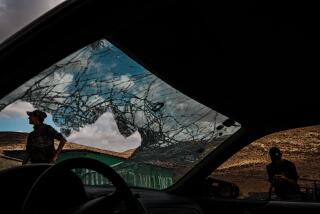Gazing Into a Soccer Ball, Catching a Glimpse of Peace
SAKHNIN, Israel — The celebration roses are dying, but the silver trophy shines and the young men playing soccer between the olive trees have brought joy to the windy mountains of northern Israel.
Surrounded by scrub brush and pine, this pinprick on the map is not accustomed to prominence, but prominence has found Sakhnin, home to the first Arab soccer team to win the Israeli State Cup championship. In a country bruised by explosions and frayed by hate, the Sakhnin team of 14 Arabs, seven Jews and five foreigners has led to reflection on the possibility of peaceful coexistence.
“This victory is something that’s never happened before,” says Kasim Raya, the town’s deputy mayor, a husky man with a miniature globe on his desk. “It is affecting how all people are looking at relations between Arabs and Jews. For the first time, a small-town team won the championship, a team without a stadium, an Arab team.”
Such high expectations in Israel are usually ephemeral. History, politics, fear and suspicion intrude as suicide bombers and tanks shatter even remote glimpses of harmony. But for a moment, no matter how brief, the scrappy guys from Sakhnin, where 40% of homes are not hooked up to public sewage, have slipped into the nation’s imagination.
The team won the championship last month and will represent Israel at Europe’s UEFA Cup tournament this summer -- generating unprecedented pride among the 1.1 million Israeli Arabs who make up 18% of the nation’s population. Israeli Prime Minister Ariel Sharon has promised that the government will help fund a new stadium.
“We are the team for the simple people,” says Nidal Shalata, a wing defender. “We have Arabs, Jews and foreigners for one cause. When we play in Europe, it will change the image of Israel. We have been able to achieve what politicians have not.”
Sakhnin sits in the rocky hills near the Lebanese border. It is a city of half-finished homes and mosques, where boys carrying summer watermelons wobble through alleys and girls stroll arm in arm past windows of wedding dresses. Known for its politically defiant streak, Sakhnin is building a memorial in a traffic circle to honor residents killed in 1976 protests against Israeli land policies.
The sun is strong and laundry flutters from rooftops. There’s clattering behind the apartment door of Rasmeyeh Ghnaim, the wife of the soccer team’s manager, Mazen. She knows each of the players, but she is busy cooking chicken for lunch and has little time to talk. She has to be ready for visitors. Two busloads of revelers arrived in town the other day. More may come, Ghnaim said, and not just Arabs, but Jews too.
“I believe this team can bring people together,” she says.
Up a winding road, some men stand in the shade of a photo shop. Mahmoud Nahri wears creased pants, a crisp shirt and polished black shoes. He and the others share cigarettes through empty hours. It doesn’t take much to get them to reflect on the meaning of the victory.
The team, the men say, is made up of the “sons of Sakhnin,” some foreigners, including one player from Brazil, and Jews, whom the men say they like and respect as athletes.
“All the people are very happy,” says Jamal Hyadry, a thin man in jeans and a white T-shirt. “This is a historic moment.”
Nahri disagrees. “This victory is not historic,” he says. “It’s not significant. We have unemployment and discrimination. These things still exist and most Israelis don’t accept us as citizens. The championship is a dream, yes. But this victory does not solve our poverty. They let us use our legs and our speed. When will we be given a chance to use our brains?”
“But it’s given us a chance to improve coexistence with the Jews,” says Ahmed Shalata, who has just picked up pictures of his sons holding Sakhnin’s silver trophy. “It’s good.”
The conversation twists and veers. Not even a soccer game is free of politics and jangled emotions in a nation where joy is salted with bitterness. The men note that Israeli bulldozers were destroying Palestinian homes in the Gaza Strip’s Rafah refugee camp as the Sakhnin team was heading toward its 4-1 championship victory. Israel says the military campaign -- which resulted in the leveling of scores of homes and the deaths of at least 40 Palestinians -- is necessary to plug tunnels supplying militants with weapons. The men of Sakhnin view the destruction as another humiliation for Arabs.
“On the one hand, we’re happy about the victory,” Raya says from his office in City Hall. “On the other, we couldn’t ignore what was going on in Rafah. Is the soccer championship a symbolic victory? Maybe. Events have their own lives, and most of the time they’re short. The headlines change very fast. In a month or two, even this victory might be forgotten with new headlines.”
At his small falafel restaurant on the main street, Amjad Raya, a relative of the deputy mayor, reflects on his clientele. Raya, a computer engineer, says 20% of his customers are Jews from outlying neighborhoods. He relies on their money, but when there’s trouble in the West Bank or Gaza, the Jews stay away, fearing Palestinian reprisal. Raya says he hopes the soccer victory will ease such fears and create a tighter community.
“We need money, but we really need a better relationship with the Jews. We need them to come to Sakhnin,” says Raya, the son of a school principal. “The problems are bigger than business. We Palestinians must feel we are part of the country, that we are a little part of Israel.”
Dina Shalata is dressed in a blue headscarf and matching dress. She is happy. Her son Nidal, the wing defender, has become a hero on these crooked streets. She serves guests bowls of watermelon and bananas. So many people have come. “When I got married, I didn’t have this many guests,” she says as boys giggle outside and a soccer ball scrapes in the dirt.
Her home has little furniture and few pictures. Nidal’s 1-year-old daughter sleeps on a cushion. Nidal returns home with sweat and dust on his brow. Lean-faced and wiry, Nidal doesn’t want the championship feeling to fade. He’s recorded many images since the victory with the video camera in his cellphone.
Arabs have been calling to congratulate the team -- at the same time a conservative Israeli government minister has called for the removal of most Israeli Arabs from the country.
Glory days dwindle fast in these mountains. But for many, a soccer team of Arabs and Jews is a novelty offering momentary diversion from a conflict that has killed hundreds of Israelis and Palestinians. “We’re a minority in the state. We’re not equal in many things,” Nidal says, aiming his cellphone toward a visitor. “I’m very happy we won this cup. I want to keep the team in the top league and represent the Arabs and the state as best I can. We came from the bottom and we wanted to prove ourselves, and we had the whole support of the town.”
Fleishman of The Times’ Berlin Bureau was recently on assignment in Israel.
More to Read
Sign up for Essential California
The most important California stories and recommendations in your inbox every morning.
You may occasionally receive promotional content from the Los Angeles Times.











